Explain the Role of Research for Evidence-Based Practice in Health and Social Care
Importance of EBP in Health and Social Care
- Evidence-based practice (EBP):
- gives both patients and health providers more care options;
- allows for customisation and individualisation of nursing care and makes it more effective, dynamic, and streamlined;
- improves clinical judgement at all stages of nursing care;
- pushes health workers to explore and discover alternatives;
- takes advantage of new knowledge developments and keeps the medical field up to date with the latest technological advances (Davies 2012).
Recently, evidence-based practice has gained momentum in the medical field. In this context, evidence is defined as research findings, knowledge from basic science, clinical knowledge, and expert opinions. Practices, in turn, revolve around evidence and are grounded in hard data: certain procedures draw on scientific discoveries with the main objective to have desired patient outcomes across various settings and geographic locations (Thomas 2013). First and foremost, the impetus for evidence-based practice came from the new challenges that health and social care is facing today. The field is driven to attain cost containment and at the same time, ensure greater availability of health services and information. Evidence-based practice gives both patients and health providers more care options. It allows for customisation and individualisation of nursing care and makes it more effective, dynamic, and streamlined. Lastly, evidence-based practice improves clinical judgement at all stages of nursing care. The approach does not define best practices and support those that exist already; instead, it pushes health workers to explore and discover alternatives. Evidence-based practice takes advantage of new knowledge developments and keeps the medical field up to date with the latest technological advances (Davies 2012).
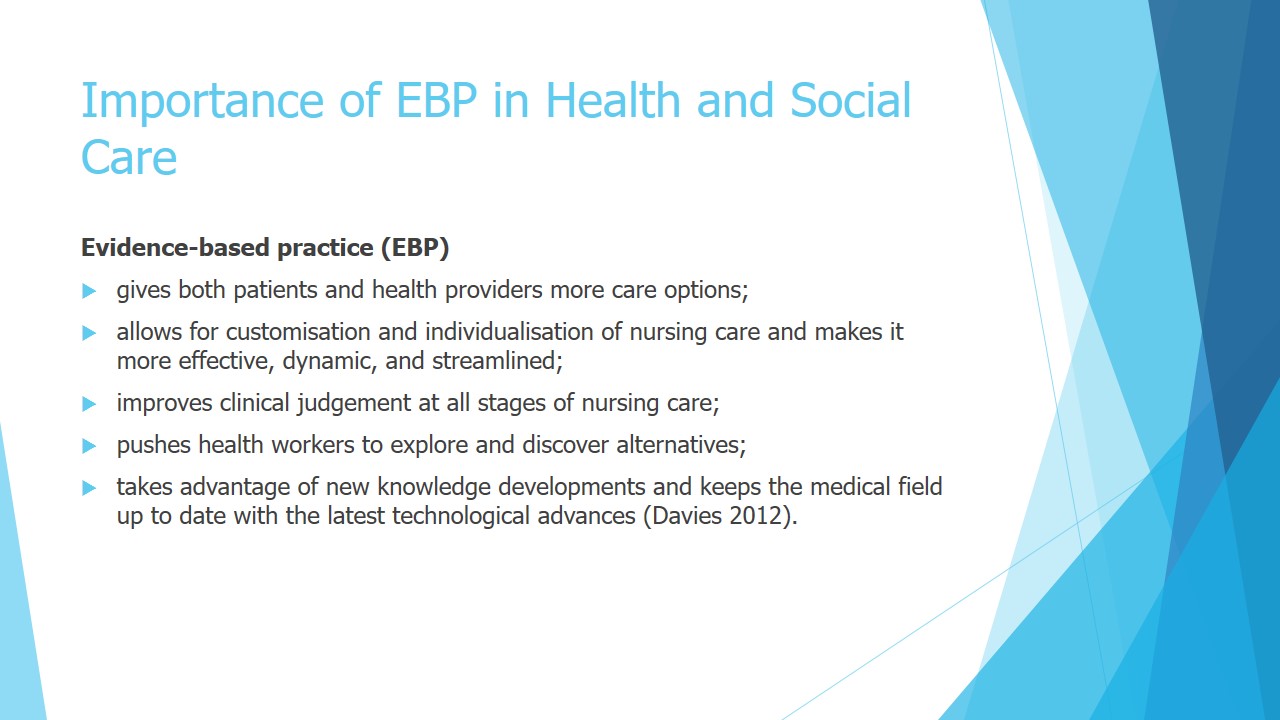
Purpose and Process of EBP in Health and Social Care
- Purpose: to attain the best possible patient outcomes, keeping the expenses as low as possible (Carter 2000).
- Process:
- Form a scientific inquiry,
- Search relevant information.
- Critically appraise the information.
- Integrate evidence with clinical expertise and patient preferences (Taylor 2014).
The main objective of evidence-based practice is to foster sustainable changes aimed to attain the best possible patient outcomes, keeping the expenses as low as possible (Carter 2000). The process of implementing evidence-based practice can be broken down into a few steps as follows:
- Form a scientific inquiry. The process starts with asking the right question: a nurse is to convert the need for information into an answerable question. It may concern different aspects of care such as prevention, diagnosis, therapy, causation, and others.
- Search relevant information. To answer the question, a nurse needs to track down the best evidence. At that, he or she might need to conduct a literature review, proving and cross-referencing information. It is essential that the findings of the studies reviewed are conclusive and provide clear and applicable practical implications.
- Critically appraise the information. Critical thinking is one of the key skills that a nurse researcher needs to possess. Not any published study deserves trust, and by knowing the basics of methodology, a nurse can tell valid research from unreliable. The evidence needs to be evaluated for its closeness to the truth, the magnitude of the effect, and applicability.
- Integrate evidence with clinical expertise and patient preferences. Implementation might be the most challenging stage as a patient’s biology, values, and circumstances need to be considered.
- Evaluate the outcomes. Positive patient outcomes are the main objective and, therefore, should be subject to scrutiny. A nurse should be able to draw conclusions regarding the effectiveness of the chosen practice and outline growth areas to improve the procedures in the future (Taylor 2014; Rowles & McNaughton 2017).
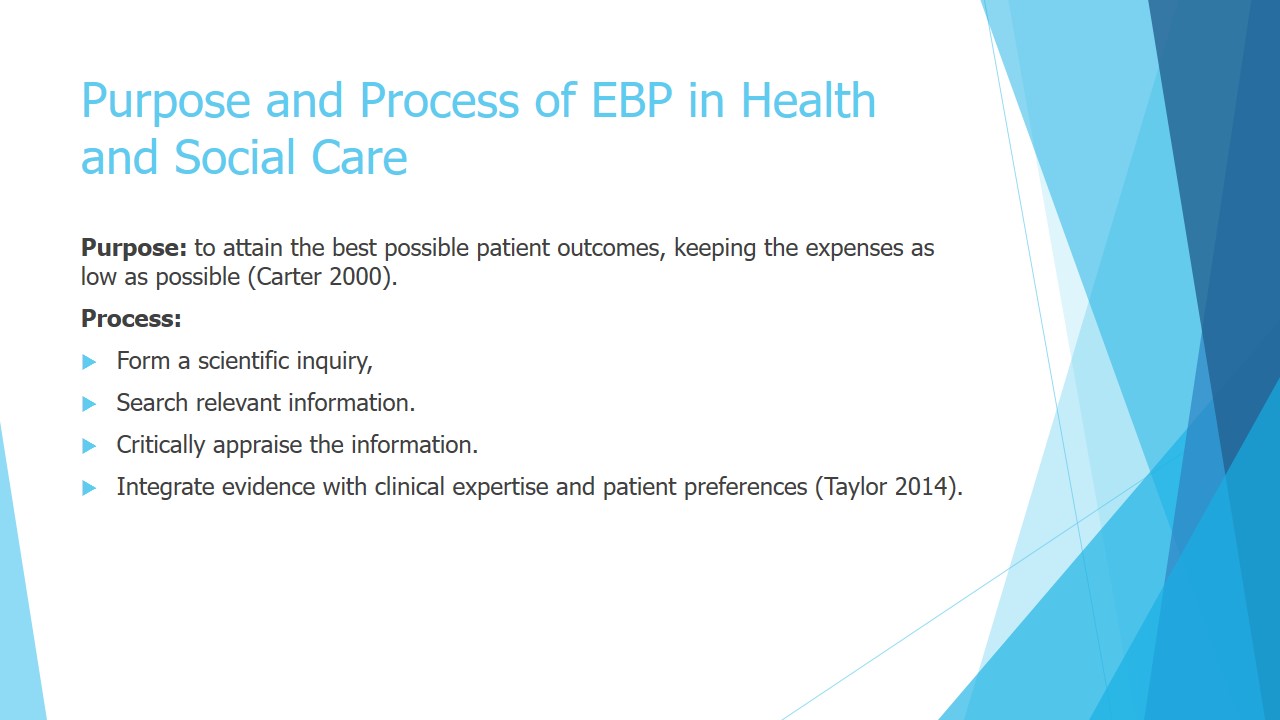
Literature Review: Skills and Qualities
- A nurse needs:
- To possess well-developed critical thinking skills,
- To be able to distinguish a reliable publication from a bogus one,
- To evaluate the reliability and validity of findings,
- To provide a balanced view of the chosen topic and include studies that show both negative and positive results for a fuller picture (Aveyard, 2014).
In order to conduct a literature review that could be held to the standards of the scientific community, a nurse needs to possess well-developed critical thinking skills (Aveyard, 2014). As of now, nurses can access an ample body of research regarding any topic of interest. However, the question remains as to how to tell a reliable publication from a bogus one. In this case, a health worker needs to be familiar with the basics of research methodology such as sampling and study design. Different study designs have their own unique challenges and limitations, which needs to be considered when conducting a literature review. A nurse needs to be able to provide a balanced view of the chosen topic and include studies that show both negative and positive results for a fuller picture.
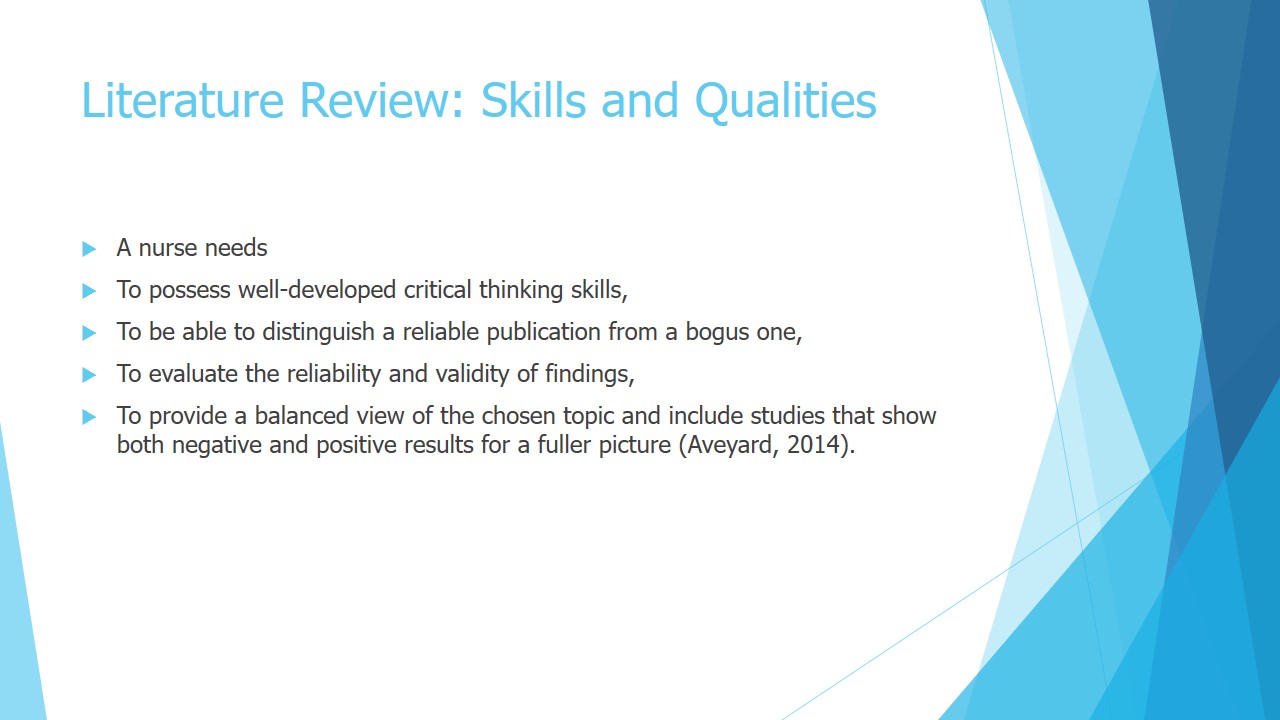
Personal Analysis
- I am committed to continuing education and self-learning.
- I am savvy with scientific databases and have excellent searching skills.
- I am familiar with the basics of research methodology and I know how scientific papers are written.
- I can summarise information from a large body of work, leaving out unnecessary details and focusing on the key points.
As of now, I find my skills and knowledge sufficient to conduct a literature review. Here is a breakdown of my current expertise:
- I am committed to continuing education and self-learning. I see value in accumulating knowledge, keeping myself up to date, and putting what I learned to good use.
- That being said, I am savvy with scientific databases and have excellent searching skills;
- I am familiar with the basics of research methodology and I know how scientific papers are written. I know the purposes, particularities, and limitations of each design and can tell whether it is appropriate for a specific scientific inquiry. My knowledge about sampling methods helps me locate reliable studies with inferential results;
- I can summarise information from a large body of work, leaving out unnecessary details and focusing on the key points.

Ethical Research Skills
- Ethical research should be based on the key principles:
- Patient autonomy – respect of a patient’s self-agency and integrity (Royal College of Nursing 2004).
- Nonmaleficence – prioritisation of a patient’s safety and well-being above all (Ellis 2016).
- Beneficence – promotion of positive patient outcomes (Ellis 2016).
Innovation, desire for personal improvement, and autonomy are three pillars of excellent nursing research (Maher et al. 2010). When working in the medical field, be it practice or research, a nurse cannot and should not dismiss the human factor. Conducting a study should include ethical considerations to make sure that patients’ rights and liberties are not being violated. Ethical research should be based on the key principles applicable to nursing care as a whole:
- Patient autonomy. A nurse needs to respect a patient’s self-agency and integrity and take up the role as a mediator and not a controller in healthcare processes. If a patient is a potential subject to new evidence-based practice, he or she is in their right to request further information. Their decision to participate in a study should also be strictly voluntary and well-informed. A nurse should never hide any essential facts about a study’s purposes and information ownership from patients (Royal College of Nursing 2004).
- Nonmaleficence. A nurse should prioritise a patient’s safety and well-being above all. Therefore, it is not appropriate to subject a patient to treatment or put him or her in such circumstances that can cause harm. Study participants and respondents should keep both their physical and mental health intact (Ellis 2016).
- Beneficence. Positive patient outcomes are the main objective of nursing research. A study should advance the right causes and enhance care delivery and patients’ well-being (Ellis 2016).
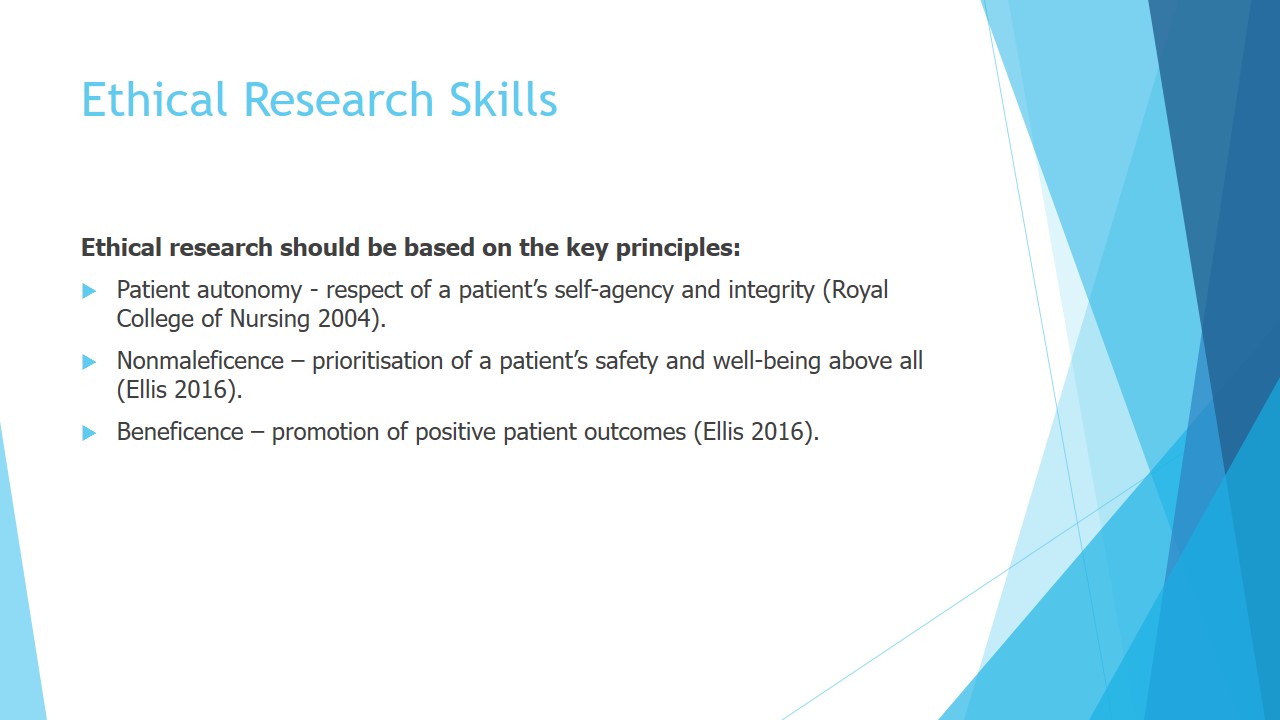
Lo 2: Conduct a Review of Key Literature Relating to a Research Topic Towards Improvements in Care Practice
Communication is defined as the exchange of thoughts, emotions, and opinions.
- Poor patient-nurse and interprofessional communication is directly associated with worse patient outcomes:
- 60% of all adverse hospital events are directly caused by or associated with poor communication (Müller et al. 2018);
- Nurses may give patients wrong medications or incorrect doses of the right ones due to poor communication between colleagues (Ali 2017);
- Problems in an end-of-shift handover can lead to patient harm.
- Potential solutions:
- Using simulated patients for developing communication skills in nurses (MacLean et al. 2017);
- Utilising technologies to improve data documentation (Wachter 2016).
- Attributes of effective communication:
- Communication covers both verbal and non-verbal aspects of patient-nurse interactions (Vogel, Meyer & Harendza 2018);
- Affiliative communication style;
- Empathy (kindness, friendliness, reassurance);
- Active listening, being courageous to raise concerns and make changes (NHS England 2013);
- Committing time to communicate.
- Essential communication skills:
- Good first impression;
- Development of calm and comfortable environment;
- Power of touch;
- Eye contact;
- Listening and hearing (Clarke 2015).
- Barriers to positive relationships:
- Time constraints;
- Language discordance;
- Embarrassment and anxiety;
- Different values and cultural beliefs;
- Environmental issues (Ali 2017).
The educational process should address communication skills, as they are vital for ensuring the culture of openness and transparency (Commission on Education and Training for Patient Safety 2016).
Communication is defined as the exchange of thoughts, emotions, and opinions between two or more parties (Fitzpatrick 2018). In the medical field, these can be a nurse, patients and their relatives, and third-party providers. The issue of therapeutic communication has gained more traction in recent years as the healthcare community recognised the holistic approach toward patient care as the most appropriate and humanistic. Treating a person holistically means acknowledging his or her personal and physical complexity and understanding that apart from physiological needs, they also have emotional needs that are to be addressed.
Excellent patient-nurse and interprofessional communication is directly associated with better patient outcomes and vice versa. For instance, Müller et al. (2018) note that 60% of all adverse hospital events are associated with or directly caused by poor communication. Ali (2017) reports that poor communication between nurses may result in the provision of wrong medications or incorrect doses of the right ones to patients. In addition, the lack of communication in an end-of-shift handover can lead to patient harm because the vital information may be passed incorrectly.
The situation seems critical; however, recent studies show that even small, incremental changes can improve work processes for the better. For example, healthcare institutions can utilise simulated patients to help nurses to develop communication skills. Moreover, Wachter (2016) suggests that it is vital to implement technologies to enhance the quality of communication and care. The author argues that such a measure can improve the documentation of patient information, which can eliminate the risks of inappropriate communication.
The question arises as to what makes nursing communication effective and what measures can be undertaken to make it such. In their study, Vogel, Meyer and Harendza (2018) discuss the vital aspects of nurse-patient communication. These aspects include:
- Communication covers both verbal and non-verbal aspects of patient-nurse interactions.
- Affiliative communication style allows for reducing anxiety in patients and encourage them to be open;
- Empathy, including a kind, friendly, and reassuring attitude can help patients to recover and increase their satisfaction with healthcare services (Vogel, Meyer & Harendza 2018);
In addition, NHS England (2013) reports that it is vital to implement active listening skills to ensure effective communication and provide patients with necessary support. Nurses should have courage to speak up about their possible concerns and advocate for changes in medical institutions’ approaches to care. Finally, it is vital for nurses to commit enough time to communicate with individuals, as sometimes, it is necessary to establish trust-based relationships with patients gradually (NHS England 2013).
Thus, it is possible to say that therapeutic communication is a complex phenomenon that draws on a nurse’s general personality traits as well as his or her ability to be empathetic, be a good listener, and have a courage to make changes in existing policies.
Clarke (2015) elaborates further on what communication skills a nurse should possess to advance patient care. The researcher put an emphasis on making a good first impression, as patients tend to judge nurses when they enter the room and before they start talking. The second key element as stated by Clarke (2015) is establishing a calm and comfortable environment. Such an environment implies ample time: a nurse should let a patient make decisions at their own pace, or let them express their feelings and emotions freely. Moreover, nurses should use eye contact and be ready to listen to patients’ concerns and hear them. Lastly, the researcher notes that care providers should use touch to reassure patients or to make them feel comfortable (Clarke 2015).
Admittedly, the reality is vastly different from what experts in communication prescribe. As of now, many health workers may struggle with building wholesome relationships with their patients, which calls for more research on barriers to therapeutic communication. According to Ali (2017), common barriers include time constraints, language discordance, embarrassment and anxiety, different values and cultural beliefs, customs, and traditions. Apart from those factors, there are personal reasons as to why a nurse fails to communicate clearly. Communication breaches can be attributed to the complex process of encoding and decoding of information. Simply put, patients’ input may not be interpreted as expected, which may lead to a conflict. Surely, this is not a definite list of factors, which indicates a gap in research. For instance, it is still not clear how nurses’ job dissatisfaction and burnout correlate with their communication abilities.
All points taken into consideration, it seems like there is a need for educating nurses on the key communication aspects. Commission on Education and Training for Patient Safety (2016) reports that the educational process should address communication skills, as they are vital for ensuring the culture of openness and transparency. Education that fosters collaboration and information-sharing can eliminate break downs in care and enhance patient safety. There are several ways in which communication aspects can be taught to nurses. For instance, MacLean et al. (2017) put forward an interesting idea of using simulated patients, be it live actors or actors recorded on camera. In this case, training participants are put in a less stressful setting than that at their medical facility. They can try out different techniques without a risk to ruin a relationship or have an adverse result. In summation, one can safely say that communication skills are not a given but subject to teaching and training.
The present literature review is both valid and reliable due to a variety of factors. First, it draws on peer-reviewed publications that are also recent enough to be relevant. The review not only summarises the contents but also critically interprets, contrasts, and compares the results. It highlights patterns, conflicts, and knowledge gaps as well as addresses the rationale for further research.
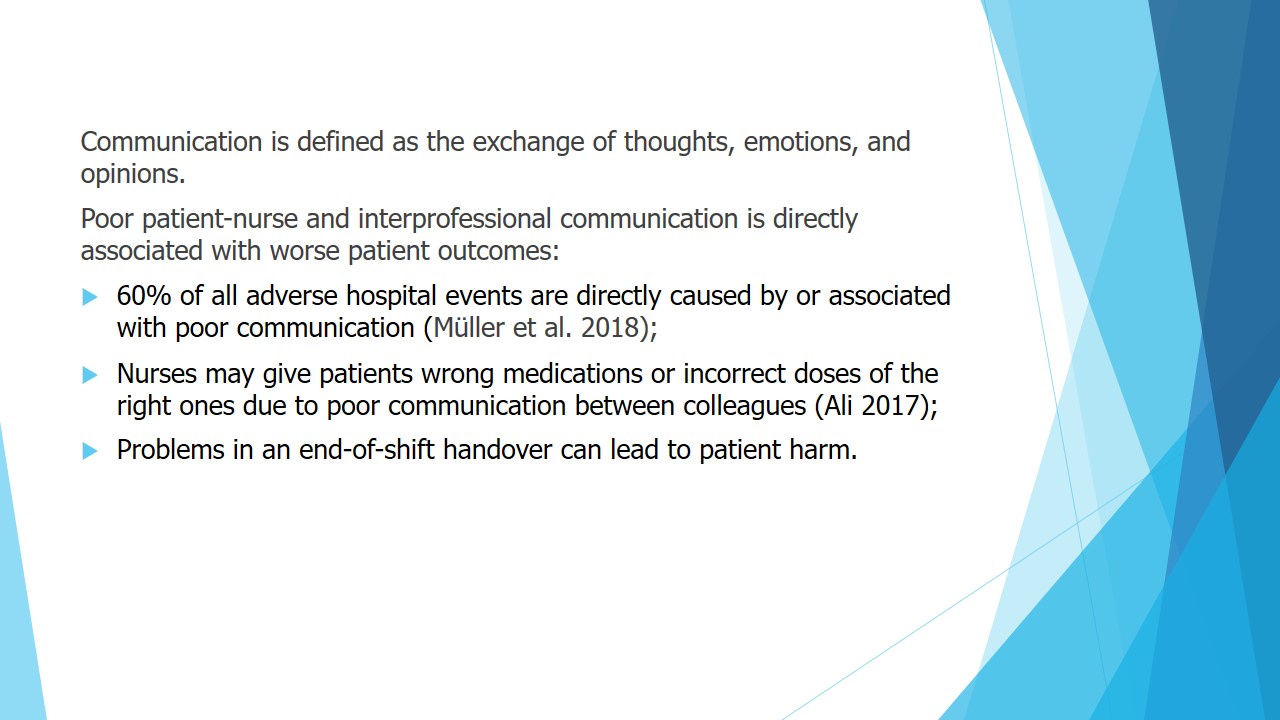
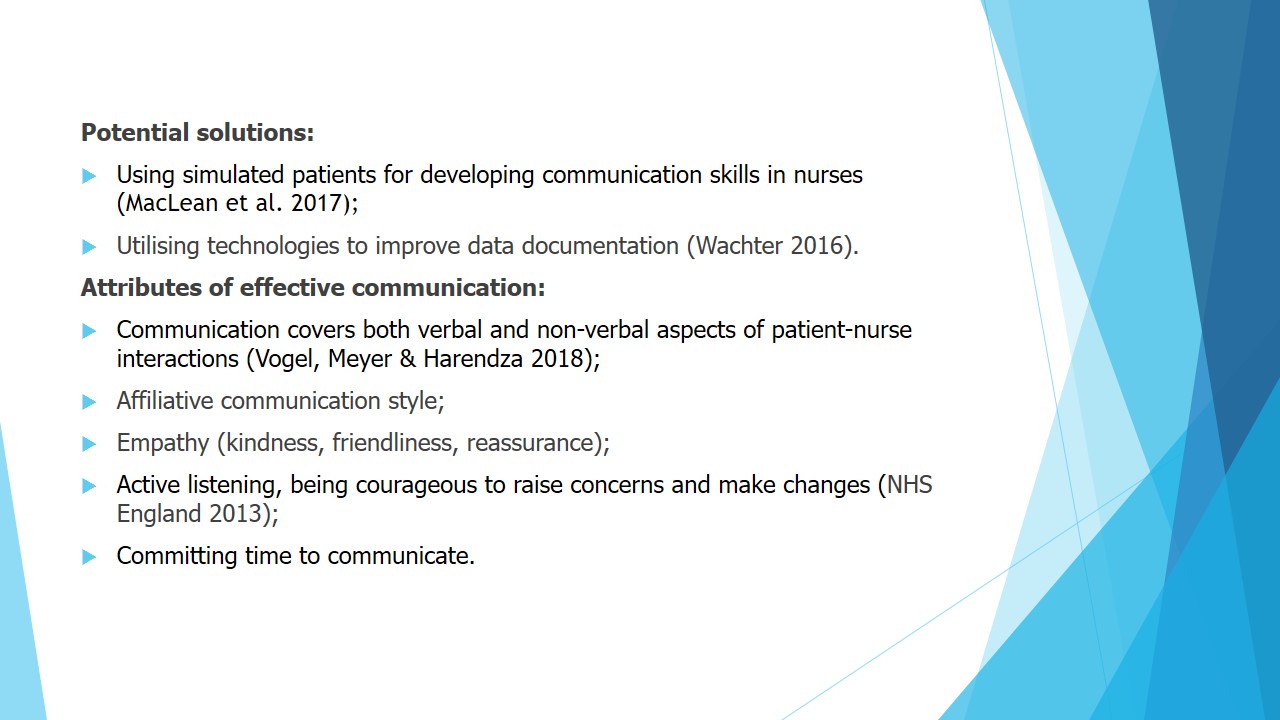
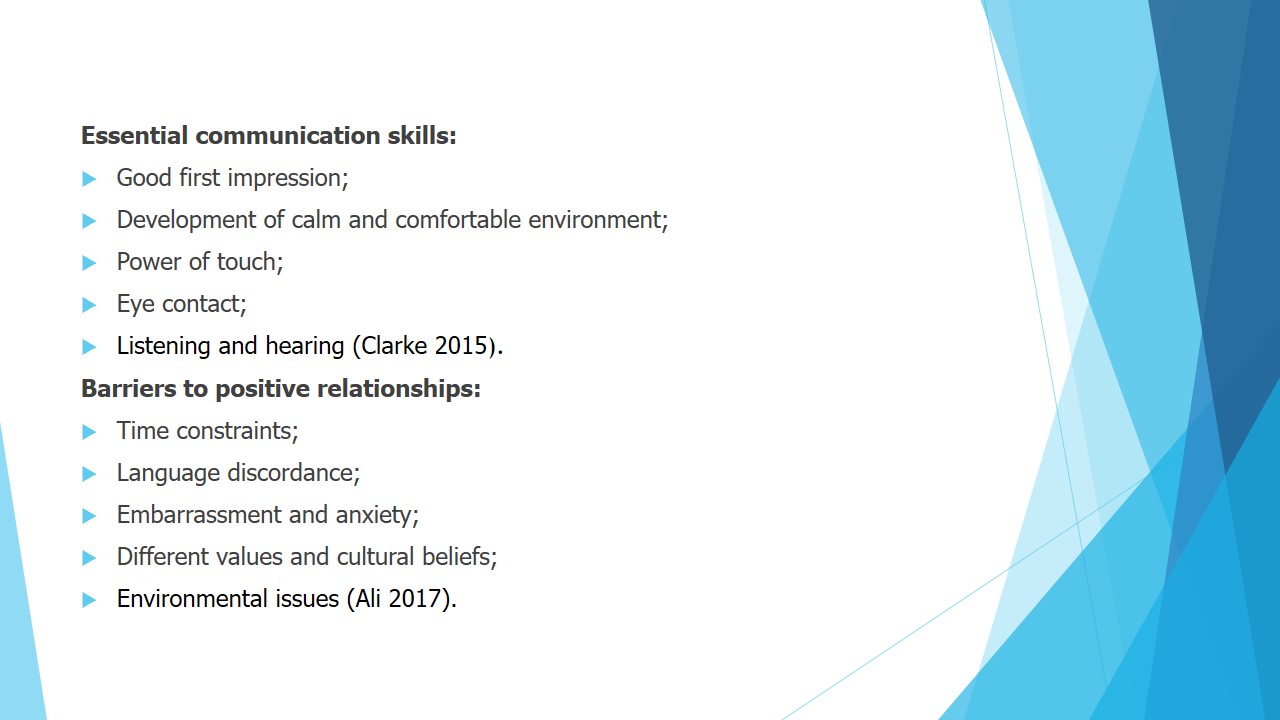

Lo 3: Develop a Project Proposal Using Evidence-Based Practice
- Research title: Nursing stress and burnout and therapeutic communication: A quantitative study.
- Research question: Is there any correlation between stress and burnout in nurses and their ability to maintain therapeutic communication?
- Aim: To explore the relationship between the stress and burnout level in nurses and their ability to effectively communicate with patients;
- Objectives
- To identify the level of stress and burnout in study participants throughout one month;
- To measure nurses’ communicative faculties throughout a one-month observation;
- To compute a correlation or prove the lack thereof between the aforementioned two factors.
- Methodology: Qualitative design
- Timeframe:
- Month 1: Literature research, methodology development, conceptualisation
- Month 2: Recruitment and sampling
- Month 3: Observations: stress and burnout testing; communication ability testing;
- Month 4: Data processing and analysis, inference, and writing a paper.
- Sampling: stratified convenience sampling
- Ethical principles to observe:
- Confidentiality,
- Autonomy (British Psychology Society 2018).
- Justification:
- The level of nurses’ burnout is positively correlated with the degree of patient safety and the overall quality of their performance (Hall et al. 2016);
- Practitioners exposed to excess stress at the workplace tend to be less attentive to patients and engage in more conflicts with colleagues (Wilkinson et al. 2017);
- Considering the detrimental effects of nurse burnout on service delivery, this proposal seeks to find a solution or at least, outline the course of action to these problems.
Methodology
The present project will employ quantitative design that is used to test objective theories by exploring the links among variables. Considering that quantitative research deals with objective data and statistical analysis, it is usually allows receiving straightforward, precise answers to formulated questions (Watson 2015)
Time frame
- Month 1: Literature research, methodology development, conceptualisation
- Month 2: Recruitment and sampling
- Month 3: Observations: stress and burnout testing; communication ability testing;
- Month 4: Data processing and analysis, inference, and writing a paper.
Sampling
The most appropriate sampling method could be stratified convenience sampling. Convenience sampling will allow us to spend more time with our respondents due to their vicinity to our research centre. If the sample is stratified, it will account for more randomisation and, therefore, enhanced reliability (Kumar 2019). It is essential that the sample is diverse: there is a need to recruit nurses of different ages (both newcomers and experienced), races, and genders (especially given that men are often underrepresented).
Ethical considerations
Since the present project implies recruitment of human participants, it is essential that the ethical aspect is considered. The research embarks on a sensitive topic that deals with the emotional side of the nursing profession, namely, the risk of stress and burnout. More often than not, these two phenomena occur not only due to a nurse’s traits but also the work environment. Thus, in the process of surveying, it is possible that participants express their dissatisfaction with their current work conditions. This information should not be leaked so that nurses’ reputation is not compromised. Thus, their confidentiality and anonymity will be ensured; besides, access to data will be restricted and limited to immediate researchers (British Psychology Society 2018).
Measures of success
The present proposal has the potential to be successful due to the relevancy of the topic under investigation. According to Hall et al. (2016), the level of nurses’ burnout is positively correlated with the degree of patient safety and the overall quality of their performance. Moreover, practitioners exposed to excess stress at the workplace tend to be less attentive to patients and engage in more conflicts with colleagues (Wilkinson et al. 2017). Considering the detrimental effects of nurse burnout on service delivery, this proposal seeks to find a solution or at least, outline the course of action. Besides, the project has clear aims and objectives as well as the methodology that is applicable given the researched issue. One of the possible problems that may arise is the lack of clarity regarding such concepts as stress and communication. It goes without saying that quantifying notions from the field of psychology may be somewhat challenging. Yet, it is nothing insurmountable if the researchers prepare a strong theoretical basis and operationalie the concepts properly.
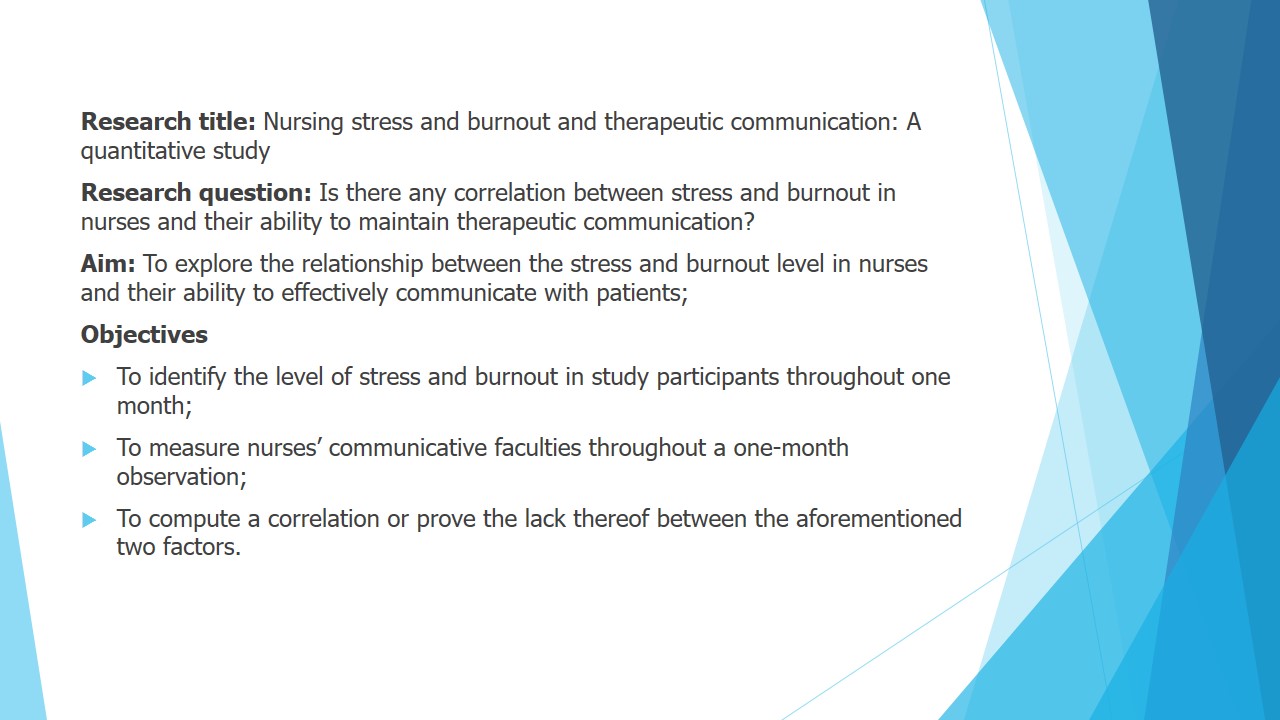
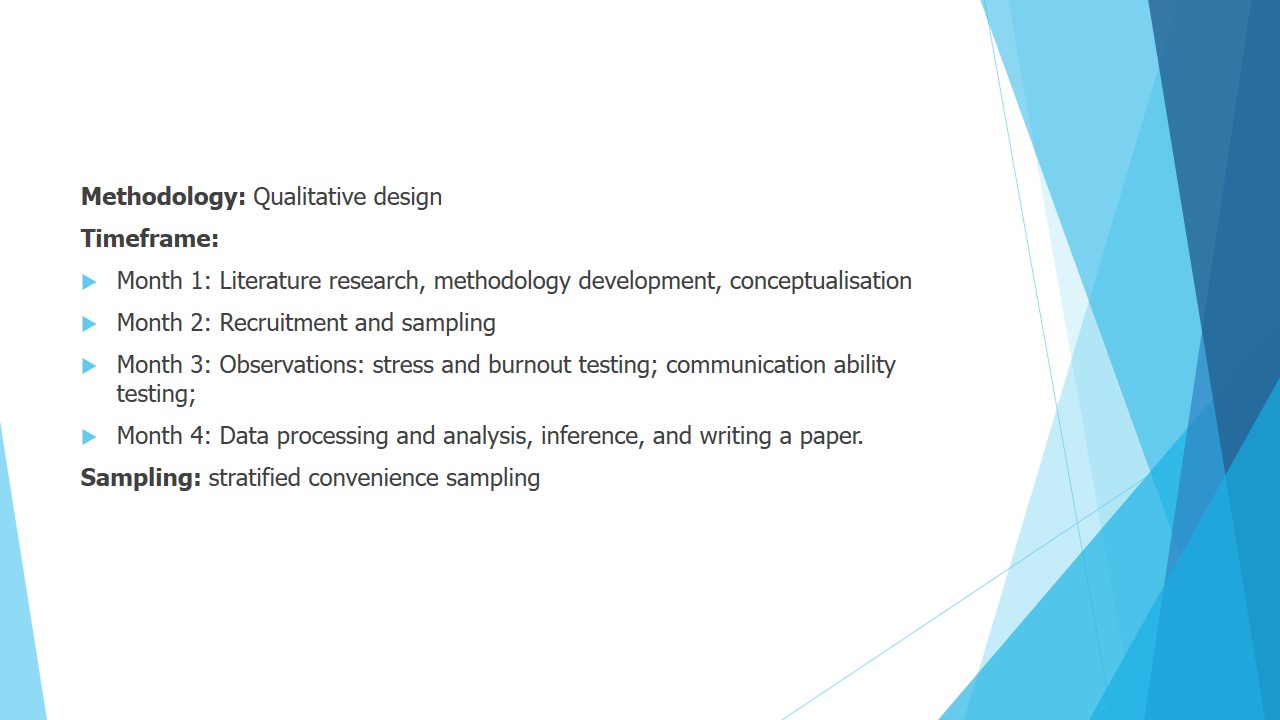
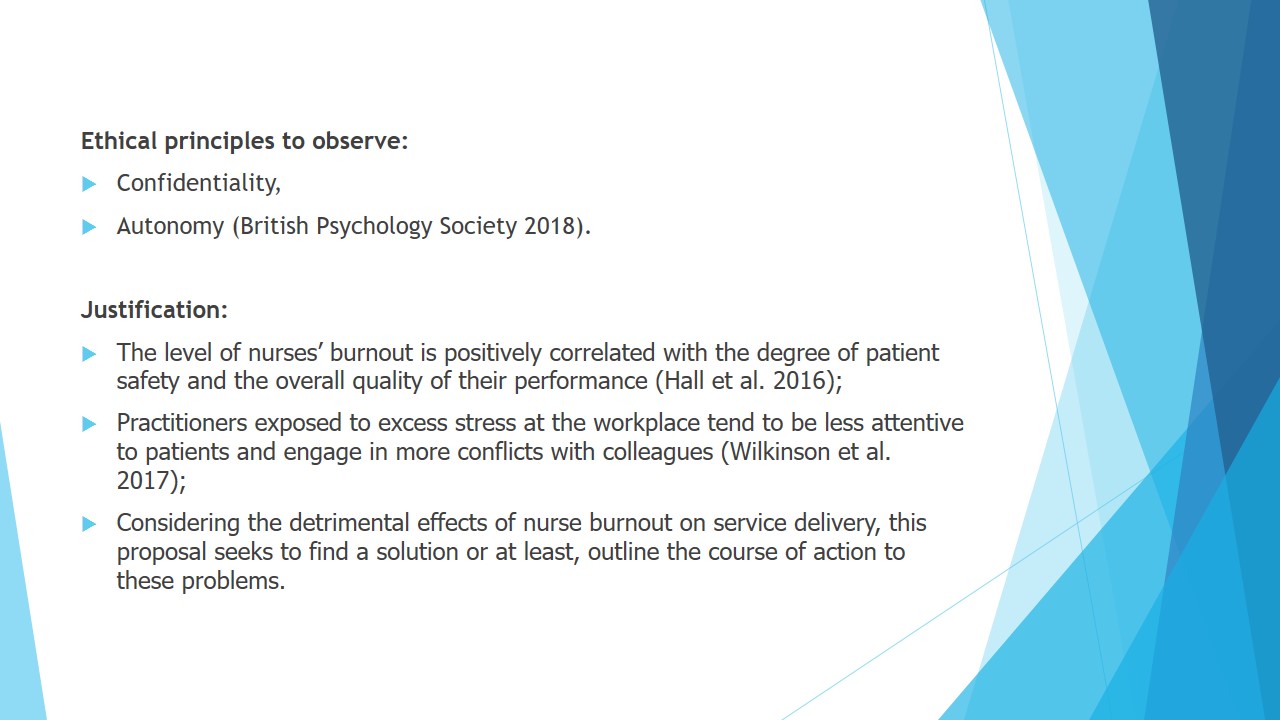
Lo 4: Examine the Value of the Literature Review Process in Influencing Positive Change in Health and Social Care Practice
Influence of Literature Review on EBP
- Literature review:
- Allows practitioners to locate information about most effective practices and methods à supports the attainment of EBP objectives of improving the quality of either medical or social care services in any area of interest (MA Education 2017; Newell 2010);
- Helps to identify major gaps and inconsistencies in available evidence à prompts new ideas for the design of EBP projects aimed to foster further enhancements in practice
Literature review is the very basic step in the EBP process because without seeking out and critiquing relevant evidence, it is impossible to implement EBP research projects. In any field, literature review serves three major purposes: to “inform professionals and patients of the best available evidence when making healthcare decisions; influence policy; and identify future research priorities” (Smith & Noble 2016, p. 2). It means that by allowing practitioners to locate information about most effective practices and methods, the efficiency of which is empirically verified, literature review supports the attainment of EBP objectives of improving the quality of either medical or social care services in any area of interest (MA Education 2017; Newell 2010). Besides, by helping practitioners to identify major gaps and inconsistencies in research, literature reviews may prompt new ideas for the design of EBP projects that may be carried out to collect necessary empirical data and, in this way, fill the gaps in the literature and foster further enhancements in practice.
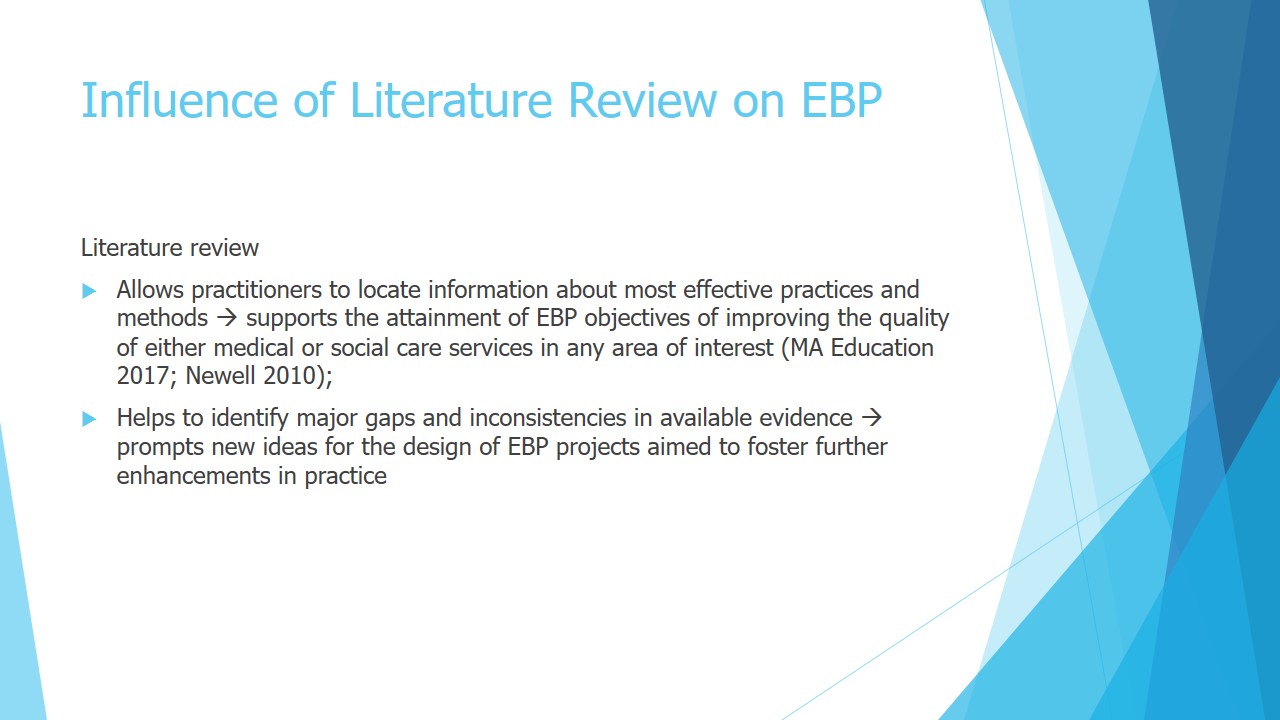
Impact of Recent Research
- Recent research fosters:
- greater cost-effectiveness,
- support for sustainable service delivery,
- and maximisation of patient benefits (Rivera et al. 2017).
Recent research has had a positive impact on current practice through a deliberate search of links between certain procedures/professional behaviours and patient/community/healthcare system outcomes à translation of obtained findings into practice (Baxter et al. 2018).
Just like any sphere of human performance, healthcare is everchanging and substantially influenced by multiple environmental factors (Rubin n.d.). Therefore, to improve the quality of services and service delivery systems in this dynamic and constantly advancing environment, it is essential to ensure that research evidence available to practitioners is also advanced and recent. According to Rivera et al. (2017), the major positive impacts of conducting research and implementing recent evidence in healthcare include greater cost-effectiveness, support for sustainable service delivery, and maximisation of patient benefits. Recent research has had a positive impact on current practice, for example, through a deliberate search of links between certain procedures/professional behaviours and patient/community/healthcare system outcomes and a consequent translation of obtained findings into practice (Baxter et al. 2018).
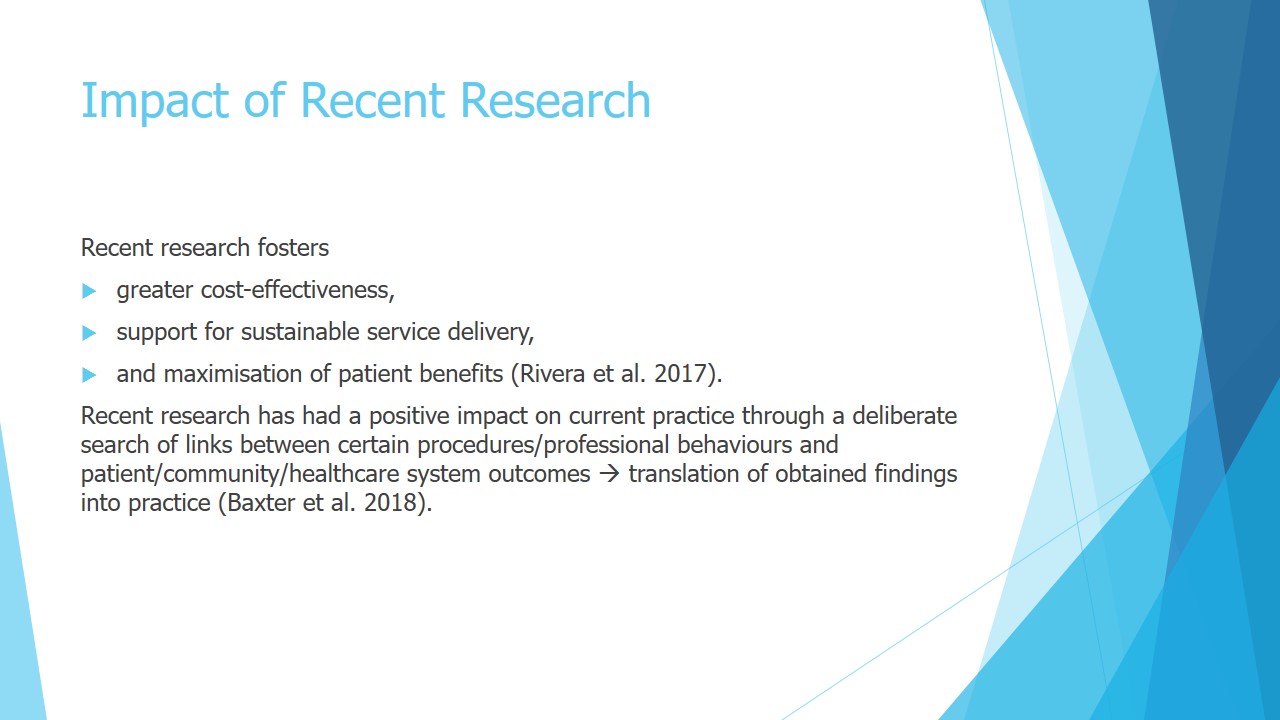
Impacts of Personal Research Process
- Active involvement in the research process allows:
- To expand the theoretical knowledge,
- To enhance critical thinking and analytical skills,
- To develop competencies needed to improve organisational environment.
Active involvement in the research process allows one to expand the range of his/her knowledge and skills. When it comes to EBP research and review of literature that is inherently involved in it, they require practitioners not only to be able to locate high-quality evidence but also utilise it judiciously, thoroughly evaluating the context and personal bias and sources of incompetence that may hinder the translation of evidence in practice (Bell 2014; Reid et al. 2017; Crookes, & Davies 2014). As my own experience has revealed, involvement in either theoretical or empirical research helps to develop knowledge through an extensive evaluation of various materials and studies. With this knowledge, one becomes able to improve individual performance and also to analyse the internal environment at the workplace more efficiently and identify any organisational barriers to better performance.
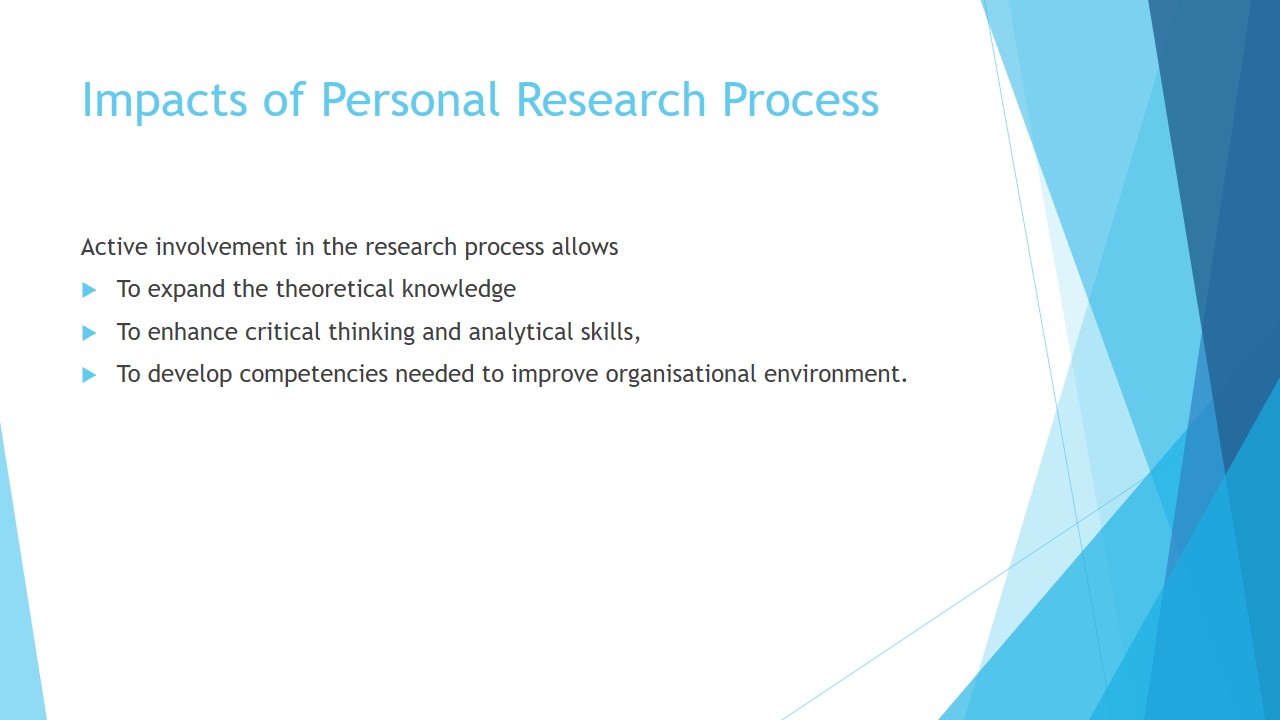
My Contribution to Innovation and Improvement
Continual engagement in professional education and development of competencies in communication, technology use, EBP and other spheres that are now essential to nursing substantially contribute to innovation in healthcare (NHS 2015).
With the ability to evaluate hospital environments supported by knowledge acquired through research, it is possible for a practitioner and his/her team to foster various improvement initiatives at the workplace. I can say that my journey on this path has merely started as I did not participate in large-scale EBP research projects so far but undoubtedly intend to do so in the future. According to NHS (2015), continual engagement in professional education and development of competencies in communication, technology use, and other spheres that are now essential to nursing substantially contribute to innovation in healthcare. I have been involved in the process of education and training for already a long time. Besides that, I have been eager to share my knowledge with my colleagues and always willing to learn from the members of my interprofessional team. At this moment, I consider the openness to new information, as well as constant enhancement of critical thinking and EBP implementation skills, my major contributors to practice and innovation improvement at my hospital.

References
Ali, M 2017, ‘Communication skills 1: benefits of effective communication for patients’, Nursing Times, vol. 113. no. 12, pp. 18-19.
Aveyard, H 2014, Doing a literature review in health and social care: a practical guide, McGraw-Hill Education, London.
Baxter S, Johnson M, Chambers D, Sutton A, Goyder E & Booth A 2018, ‘The effects of integrated care: a systematic review of UK and international evidence’, BMC Health Services Research, vol. 18, no. 350, pp. 1-13.
Bell, J 2014, Doing your research project: a guide for first-time researchers, Open University Press, Oxford.
British Psychology Society 2018, Data protection regulation: guidance for researchers. Web.
Carter, T 2000, ‘The application of the methods of evidence-based practice to occupational health’, Occupational Medicine, vol. 50, no. 4, pp. 231-236.
Clarke, PB 2015, Communication skills required when working with older people’, Working Papers in the Health Sciences, vol. 1, no. 12. Web.
Commission on Education and Training for Patient Safety 2016, Improving safety through education and training. Web.
Crookes, PA & Davies, S 2014, Research into practice: essential skills for reading and applying research in nursing and healthcare, Bailliere Tindall, London.
Davies, J 2012, Evidence-based practice (nursing and health survival guides), Routledge, Oxford.
Ellis, P 2016, Understanding research for nursing students (transforming nursing practice series), Sage Publications, London.
Fitzpatrick, L 2018, ‘The importance of communication and professional values relating to nursing practice’, Links to Health and Social Care, vol. 3, no. 1, pp.26-40.
Hall, LH, Johnson, J, Watt, I, Tsipa, A & O’Connor, DB 2016, ‘Healthcare staff wellbeing, burnout, and patient safety: a systematic review’, PloS One, vol. 11, no. 7, p. e0159015.
Kumar, R 2019, Research methodology: a step-by-step guide for beginners. Sage Publications, London.
MA Education 2017, What is evidence-based practice?CommunityCare. Web.
MacLean, S, Kelly, M, Geddes, F & Della, P 2017, ‘Use of simulated patients to develop communication skills in nursing education: an integrative review’, Nurse Education Today, no. 48, pp. 90-98.
Maher, L, Plsek, P, Price, P & Mugglestone, M 2010, Creating the culture for innovation: A practical guide for leaders. Web.
Müller, M, Jürgens, J, Redaèlli, M, Klingberg, K, Hautz, WE and Stock, S 2018. ‘Impact of the communication and patient hand-off tool SBAR on patient safety: a systematic review’, BMJ Open, vol. 8, no. 8. Web.
Newell, R 2010, Research evidence-based practice in healthcare: second edition (vital notes for nurses), Wiley-Blackwell, Oxford.
NHS 2015, Innovation into action: supporting delivery of the NHS Five Year Forward View. Web.
NHS England 2013, Compassion in Practice – one year on. Web.
Reid, J, Briggs, J, Carlisle, S, Scott, D & Lewis, C 2017, ‘Enhancing utility and understanding of evidence based practice through undergraduate nurse education’, BMC Nursing, vol. 16, no. 58, pp. 1-8.
Rivera, SC, Kyte, DG, Aiyegbusi, OL, Keeley, TJ & Calvert, MJ 2017. ‘Assessing the impact of healthcare research: a systematic review of methodological frameworks’, PLOS Medicine, vol. 14, no. 8, pp. 1-24.
Rowles, E & McNaughton, A 2017, ‘An overview of the evidence-based practice process for novice researchers’, Nursing Standard, vo. 31, no. 43, pp. 50-60.
Royal College of Nursing 2004, Research ethics: RCN guidance for nurses. Web.
Rubin, J n.d., ‘UK Research and Innovation and the future of the social sciences’, Economic and Social Research Council. Web.
Smith, J & Noble, H 2016, ‘Reviewing the literature’, Evidence-Based Nursing, vol. 19, no. 1, pp. 2-3.
Taylor, R 2014, The essential of nursing and healthcare research, Sage Publications, London.
Thomas, G 2013, How to do your research project, Sage Publications, London.
Vogel, D, Meyer, M & Harendza, S 2018, ‘Verbal and non-verbal communication skills including empathy during history taking of undergraduate medical students’, BMC Medical Education, vol. 18, no. 1. Web.
Wachter, R 2016, ‘Making IT work: harnessing the power of health information technology to improve care in England’. Web.
Watson, R 2015, ‘Quantitative research’. Nursing Standard, vol. 29, no. 31, pp. 44-48.
Wilkinson, H, Whittington, R, Perry, L & Eames, C 2017, ‘Examining the relationship between burnout and empathy in healthcare professionals: a systematic review’, Burnout Research, vol. 6, pp. 18-29.